When it comes to city passes and travel cards, it’s usually fairly easy to figure out whether they would be worth it for you or not. For things like the Paris Pass or London Pass, they have a list of the most popular attractions and how much they cost, right there for you to see. The Swiss Travel Pass, however, is shrouded in mystery, or at least it was until I spent several days tracking down all of the prices and benefits.
A great many of the visitors and commenters on my popular page about where to go in Switzerland on a short visit are wondering whether the Swiss Travel Pass is a good deal. Embarrassingly, I’ve always had to answer that I found the pass too confusing to confidently advise people on. Now that has all changed, after literally days of research.
Note: This article was last updated in February, 2024.
Disclosure: This is a reader-supported website and some of the links are affiliate links where a small commission is paid to help keep this site going, but the cost to visitors is the same. The Swiss Travel Pass seems quite expensive at first, so it felt like it might be hard to get your money’s worth out of it. As it turns out, it’s pretty easy to get good value, and it’ll be a good deal for many visitors.
New in 2024
Prices increased an average of 5.9% from 2023 on the Swiss Travel Passes, but the Half Fare Card remains at CHF120, which is where it’s been for many years. Train fares in the country increased by similar percentages so the value is basically unchanged. There were no other notable changes to service or the included attractions and train routes.
>>>Buy the Swiss Travel Pass online
Where to stay in Interlaken and the Lauterbrunnen Valley
Since most people reading this will be visiting the Interlaken area and I get so many questions about it, I decided to write a detailed guide on which area to stay in while visiting this area.
>>>Where to stay in Interlaken or the Lauterbrunnen Valley in Switzerland
I included many huge photos in that post so readers will be able to get a better idea of what each place looks like and they are worth a look by itself.
>>>Lucerne or Interlaken: Which to visit and how long to stay?
The article just above will help you decide on how long to spend in each of Switzerland’s two best tourist areas.
Are you 100% sure where you want to go in Switzerland? This should help
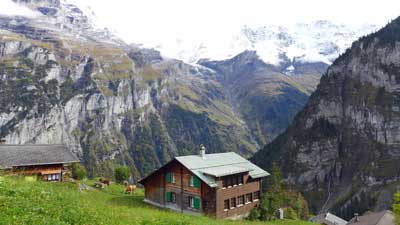
Zurich and Geneva are pleasant but dull. The good news is that Switzerland is packed with amazing sights and none of them are the big cities. If you aren’t 100% locked in yet, please read the article below and I think you’ll enjoy it.
Is the Swiss Travel Pass a good deal? Here's the short version

The bottom line is that the scenery, train journeys, and cable car rides in Switzerland are stunning and not found anywhere else in the world. They are also quite expensive if you pay for them one at a time. So no matter how you visit Switzerland, you are going to be paying quite a bit, or skipping the absolute best things that you’ve come there to see.
With good planning it’s quite easy to get great value out of a Swiss Travel Pass, but it might be a poor choice for those who don’t like to plan ahead. You can easily do a scenic train ride and a cable car in the same day, and still have time to do a scenic hike in the process.
First class or second class? Good news for most people
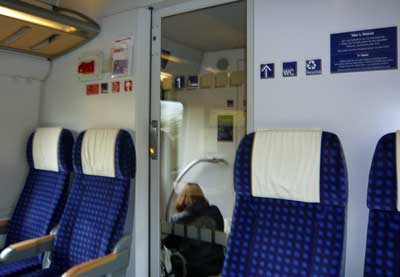
That said, Swiss Trains are literally the nicest in Europe and even the Second Class seats and carriages are nicer and roomier than trains in neighboring countries. The First Class seats are larger and nicer with only 3 across the cabin instead of 4, but honestly Second Class is perfectly comfortable for almost everyone.
Again, First Class on European trains like this is generally popular with business travelers where the company is paying and they need to get work done during the ride, and also senior citizens who don’t want to worry about a carriage full of backpackers. For most of the rest of us, Second Class is more than comfortable enough and the seat width and legroom compare to business-class airline seats. I’m a big and tall guy and I almost always travel in Second because it’s plenty comfortable enough and all the seats arrive at the same time anyway.
The longer you'll be in Switzerland, the better deal a Swiss Travel Pass will be
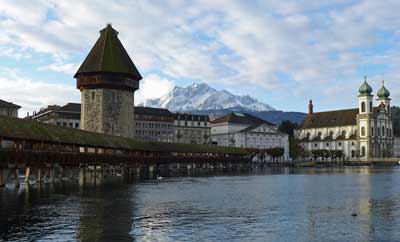
In other words, if you are staying 5 days or fewer, you have to do the math to determine your best option. But if you are spending even 6 or 7 days in Switzerland then the 6-day or 8-day Pass is almost guaranteed to be a great deal and your best choice. Once you have a Swiss Travel Pass you’ll absolutely love the ability to just hop on any train (excellent trains, always on time) and most boats and cable cars without having to worry about the cost. The per-day cost of an 8-day Pass even if you only use 6 of those days is about CHF65, and Switzerland is filled with amazing train rides and boats and cable cars that can get you that much value before noon each day.
Schilthorn (50% discount) and Jungfraujoch (25% discount) are cheaper with a Swiss Travel Pass
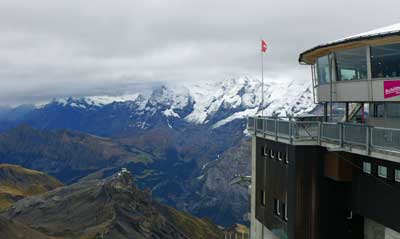
Both of those peak experiences are extraordinary and different from each other. Even so, compared to Jungfraujoch, Schilthorn is also faster and more comfortable on the way up and down. You can enjoy an excellent visit to Schilthorn in 4 hours or so (or a bit longer if you eat at the spinning Piz Gloria restaurant at the top), while a visit to Jungfraujoch requires closer to 6 hours.
NOTE: Schilthorn closes for maintenance for a week or two in late November most years.
Consider the Swiss Half-Fare Card instead
If you AREN’T going to be doing two or more of the long (and expensive) scenic train trips, you will get much better value out of the Swiss Half-Fare Card, which is explained a bit below.
Mt Rigi, near Lucerne, is 100% covered by the Swiss Travel Pass
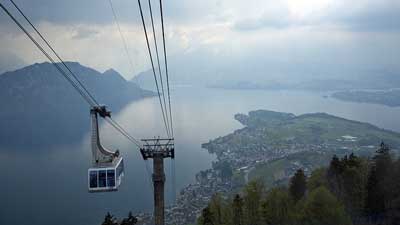
Is a Swiss Travel Pass right for you?
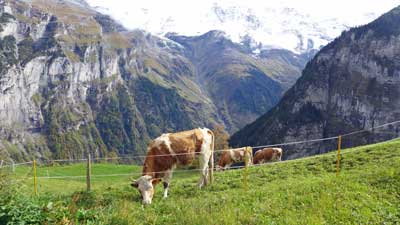
Most people only visit Switzerland for 5 or 6 days at most, so the 3-day and 4-day passes are the ones to focus on. But if you are staying for 8 days or more, those longer passes are almost certainly a great deal for you.
Long story short, if you plan on doing 2 of the more expensive scenic trains and the Jungfraujoch railway or the Schilthorn cable car, then the pass will save you money. Switzerland is expensive, but it’s worth it, and the travel pass can help make it a bit more affordable.
What the Swiss Travel Pass includes
- Free rail travel on normal trains and most scenic trains
- Discounted travel (about 50%) on popular tourist mountain trains
- Discounted travel (about 50%) on popular tourist cable cars
- Free travel on public transport in 75 towns and cities
- Free entry to around 500 museums in Switzerland
The Swiss Travel Pass covers the fare on the most popular scenic and panoramic trains. You can choose a normal seat in a regular carriage for no additional cost, but there is a supplement of CHF8 to CHF49 for a reserved seat in one of the special panorama carriages on these routes.
Prices of the 2024 Swiss Travel Pass
1st Class
- Adult 3-day Pass: CHF389
- Youth (4 to 25) 3-day Pass: 274
- Adult 4-day Pass: 469
- Youth (4 to 25) 4-day Pass: 330
- Adult 6-day Pass: 602
- Youth (4 to 25) 6-day Pass: 424
- Adult 8-day Pass: 655
- Youth (4 to 25) 8-day Pass: 469
- Adult 15-day Pass: 723
- Youth (4 to 25) 15-day Pass: 512
2nd Class
- Adult 3-day Pass: CHF244
- Youth (4 to 25) 3-day Pass: 172
- Adult 4-day Pass: 295
- Youth (16 to 25) 4-day Pass: 209
- Adult 6-day Pass: 379
- Youth (16 to 25) 6-day Pass: 268
- Adult 8-day Pass: 419
- Youth (16 to 25) 8-day Pass: 297
- Adult 15-day Pass: 459
- Youth (16 to 25) 15-day Pass: 328
Swiss Travel Pass Flex
This version costs a bit more, but you don’t have to use the travel days consecutively. It’s a great option for anyone who won’t be taking longer train rides each day.
- Adult 3 Flex days in 1 month (1st Class): CHF445
- Adult 3 Flex days in 1 month (2nd Class): 279
- Adult 4 Flex days in 1 month (1st Class): 539
- Adult 4 Flex days in 1 month (2nd Class): 339
- Adult 6 Flex days in 1 month (1st Class): 644
- Adult 6 Flex days in 1 month (2nd Class): 405
- Adult 8 Flex days in 1 month (1st Class): 697
- Adult 8 Flex days in 1 month (2nd Class): 439
- Adult 15 Flex days in 1 month (1st Class): 755
- Adult 15 Flex days in 1 month (2nd Class): 472
Where to buy the Swiss Travel Pass
The Swiss Half-Fare Card – A better option for many visitors
Far less confusing than the Swiss Travel Pass, you can instead get a Swiss Half-Fare Card, and it will be a better deal for many travelers. The price is lower and it’s much easier to do the math, and the discounts are greater on some things as well.
- Swiss Half-Fare Card for 30 days: Adults – CHF120 or US$129
What you get:
Those who buy the Swiss Half-Fare Card will get 50% discount on all trains, buses, and boats in Switzerland for up to 30 days, as well as 50% off all public transportation in 75 cities and towns.
>>>Buy the Swiss Half-Fare Card
Why the Half-Fare Card is a better deal for many
While the Swiss Travel Pass is a great deal for those doing many of the expensive scenic journeys and mountain sights within a few days, it’s not good value for those who are doing fewer of the expensive trips and/or those who are staying longer. Also, the Swiss Travel Pass only provides a 25% discount on the amazing Jungfraujoch Railway, which costs between CHF120 and CHF224 return depending on your starting point, while the Half-Fare Card provides a 50% discount.
The math is simple as well. You can just add up the cost of the trains, boats, and buses you’ll be taking while in Switzerland, and if the total is more than CHF240 or so, the Half-Fare Card will save you money.
Example itinerary:
- Zurich to Interlaken train (2nd Class): CHF50
- Schilthorn Cable Car: CHF112
- Jungfraujoch railway from Interlaken: CHF205
- Interlaken to Lucerne train (2nd Class): CHF33
- Mt Rigi roundtrip from Lucerne: CHF84
- Engelberg (near Lucerne) to Mt. Titlis Cable Car: CHF92
- Lucerne to Zurich train (2nd Class): CHF25
Total per person: CHF601
Total with Half-Fare Card (including price of card): CHF420.50
It would be tough to do all of those things in 4 days, although it is possible. If you bought a 4-day Swiss Travel Pass here is how it adds up:
4-Day Swiss Travel Pass: CHF259
Supplements for Schilthorn, Jungfraujoch, and Mt. Titlis: CHF203.25
Total cost: CHF462.25
Bottom line on the Swiss Half-Fare Card
Since the Half-Fare Card lasts 30 days and provides a larger discount on Jungfraujoch, it is better value for visitors who want to include that scenic top-of-Europe rail journey on their trip. The discounts also add up more quickly on Schilthorn and Mt. Titlis trips, just to name two examples, and you don’t have to take many longer rail journeys to get value out of the Half-Fare Card.
Swiss Saver Day Pass (A one-day unlimited travel pass)
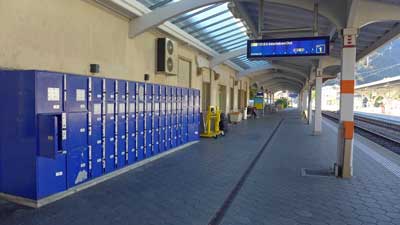
If you buy the Saver Day Pass at least 21 days in advance (and up to 60 days in advance) the 2023 cost is:
- 2nd Class (with Half Fare Card): CHF29
- 1st Class (with Half Fare Card): CHF82
- 2nd Class (with no Half Fare Card): CHF52
- 1st Class (with no Half Fare Card): CHF97
Once you research the normal cost of Swiss train fares you’ll see that the above prices are a very good deal for anyone riding more than 150 kilometers or so in a day. If you are just going, for example, from Zurich to Lucerne or Interlaken on a day, it’ll be cheaper to just buy that ticket individually. But if you are going from Geneva or Montreux to Interlaken or Lucerne then the Saver Day Pass will be much cheaper. Better still, you can use a Saver Day Pass to go from Interlaken to Geneva and back on the same day on the Goldenpass line and returning on the faster train through Bern, and it will still all be included for free.
If you don’t buy a Saver Day Pass at least 14 days in advance it’s more expensive, and if you only buy 1 to 3 days in advance it’s VERY expensive, so the key is to buy early. This is all confusing, but the Saver Day Pass should be a great option for many people only in Switzerland for one to three days.
Popular Swiss panorama scenic trains
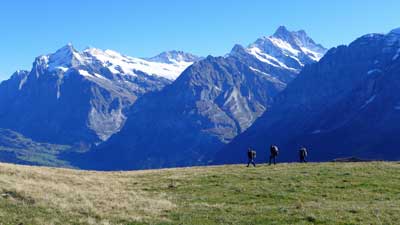
- Glacier Express
- Route: Zermatt to St. Moritz
- Train type: Panorama
- Journey time: 8 hours 3 minutes
- Distance: 291km
- 1st Class fare: CHF272
- 2nd Class fare: CHF159
- Compulsory seat reservation fee: CHF44 or 49
- Supplement for Swiss Pass holders: 13 to 33 for panorama carriage
- Bernina Express
- Route: Chur to Tirano and Lugano
- Train type: Panorama and bus
- Journey time: 4 hours 13 minutes and 3 hours 10 minutes
- Distance: 148km and 90km
- 1st Class fare: CHF113
- 2nd Class fare: CHF66
- Compulsory seat reservation fee: CHF32
- Supplement for Swiss Pass holders: 10 to 14 for panorama carriage
- GoldenPass Line
- Route: Lucerne to Montreaux
- Train type: Panorama
- Journey time: 5 hours 8 minutes
- Distance: 191 km
- Prestige Class fare: CHF131
- 1st Class fare: CHF96
- 2nd Class fare: CHF56
- Supplement for Swiss Pass holders: 8 to 15 for panorama carriage
- Gotthard Panorama Express (formerly Wilhelm Tell Express)
- Route: Lugano or Locarno to Lucerne
- Train type: Panorama and boat
- Journey time: 5 hours 21 minutes
- Distance: 182 km
- 1st Class fare: CHF164
- 2nd Class fare: CHF135
- Supplement for Swiss Pass holders: 39 to 49 for panorama carriage
- Swiss Chocolate Train
- Route: Montreux to Broc round trip
- Train type: Panorama or First Class
- Journey time: X hours X minutes
- Distance: 82 km
- 1st Class fare: CHF99
- 2nd Class fare: 89
- Supplement for Swiss Pass holders: 39
Popular Swiss scenic and theme trains
The scenic trains below are also extremely popular as sightseeing journeys rather than just as transportation, but can be used as both.
- Jungfraujoch round trip
- Route: Interlaken to Jungfraujoch
- Train type: special mountain train
- Journey time: 4 hours 41 minutes, round trip, plus time on top
- Distance: 73 km
- 1st Class fare: N/A
- 2nd Class fare: CHF224
- Supplement for Swiss Pass holders: 147 (so, a saving of CHF77)
- Gornergrat Railway
- Route: Gornergrat Railway
- Train type: Cog railway
- Journey time: 44 minutes return
- Distance: 10 km
- 1st Class fare: N/A
- 2nd Class fare: CHF90
- Supplement for Swiss Pass holders: 45
- Rigi round trip
- Route: Lucerne to Rigi
- Train type: Cog railway
- Journey time: 3 hours 25 minutes, plus time at the top
- Distance: 58 km
- 2nd Class fare: CHF78
- Supplement for Swiss Pass holders: None (this one is free with the pass)
- Mt Rigi Excursion (one-way and walk down)
- Route: Lucerne to Mt Rigi
- Train type: cogwheel train and/or cable car
- Journey time: 45 minutes up
- 1st Class fare: N/A
- 2nd Class fare: 49
- Supplement for Swiss Pass holders: 0
- Lotschberg Mountain Route and Centrovalli
- Route: Bern to Locarno
- Train type: Narrow gauge
- Journey time: 4 hours 40 minutes
- Distance: 212 km
- 1st Class fare: CHF158
- 2nd Class fare: CHF90
- Supplement for Swiss Pass holders: 5
- Jura round trip (Watchmaking Tour)
- Route: Neuchatel through Jura
- Train type: Regular
- Journey time: 3 hours 0 minutes
- Distance: 143 km
- 1st Class fare: CHF168
- 2nd Class fare: CHF108
- Supplement for Swiss Pass holders: 0
- Pre-Alpine Express
- Route: St. Gallen to Lucerne
- Train type: Regular
- Journey time: 2 hours 15 minutes
- Distance: 146 km
- 1st Class fare: CHF83
- 2nd Class fare: CHF47
- Supplement for Swiss Pass holders: 0
- Jura Foot Line
- Route: Basel to Geneva
- Train type: Regular
- Journey time: 2 hours 40 minutes
- Distance: 248 km
- 1st Class fare: CHF132
- 2nd Class fare: CHF75
- Supplement for Swiss Pass holders: 0
Popular Switzerland cable car rides
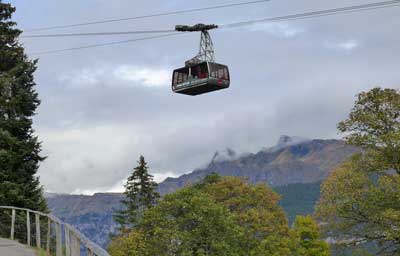
- Schilthorn
- Route: Stechelberg (Lauterbrunnen) to Schilthorn
- Train type: cable car
- Journey time: 1 hour
- 2nd Class fare: CHF108
- Supplement for Swiss Pass holders: 54
- Engelberg to Mt. Titlis cable car
- Route: Engelberg to Mt. Titlis
- Train type: cable car
- 2nd Class fare: CHF96
- Supplement for Swiss Pass holders: 46
The Swiss Travel Pass also includes free museum admission, but…
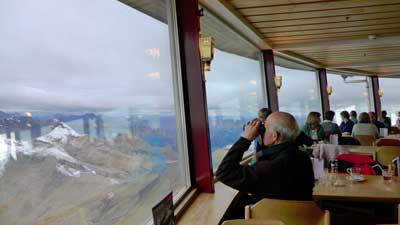
The problem is that the museums are only free on valid travel days, and almost no one would visit more than one or two museums with a Swiss Travel Pass. The trains and cable cars are so expensive that the pass gives very good value to cover those, so you don’t want to waste precious sightseeing time walking through a museum that only costs CHF10 anyway.
In other words, calculate the value of a Swiss Travel Pass on the travel savings only, and if you visit a museum here or there, then great. Most people are better off trying to squeeze in an additional train ride each day, and ignoring the museums. Switzerland is all about the outdoor scenery. As nice as the museums may be, they are not why you are there.
The pass includes free public transport in most Swiss cities
Similar to the free museum part of the offer, it’s best to ignore or minimize the value of free public transportation. It could be helpful in Zurich, but in most other Swiss tourist towns you won’t need much public transport. In fact, in Interlaken, each hotel or hostel guest automatically gets a card for free public transportation within the town (including between the two train stations).
So you might use a ride or two each day on public transport, but that won’t add up to much in terms of value of your Swiss Travel Pass.

Thank you very much Roger, I appreciate all your advice.
If we were to fit all of those activities in, would you recommend us getting the Swiss travel pass? Or something different?
We are a party of two (25yo and 22yo, will we qualify as Adults or Youths even though we are from a different country?)
Thank you,
Rohan.
Rohan,
On a short visit like that the Half Fare Card is almost always the best choice. If you use it to get the 50% discount on Jungfraujoch, you’ve almost paid for the thing with just that. Trains and most other transport and attractions in Switzerland are expensive, but once you pay that US$120 or CHF120 for the Half Fare Card, everything seems like a pretty reasonable price. The Swiss Travel Pass is only good value if you are planning at least two longer scenic train rides, and you won’t have time for that. No matter what country you are from, you’ll qualify as adults if you are 16 or over. Have a great trip. -Roger
Hi Roger
I am planning to do 8N trip. Here is my itenary.
28 May – Arrive from Paris to Zurich. Take lake cuise, bahnofstrasse and visit old town. Overnight at Zurich.
29 May – Excrusion to Lucerne. Visit Mt. Pilatus, take Golden line route. Return to Zurich. Over night at Zurich.
30 May – Excrusion to Mt. titlis. Return to Zurich for overnight stay.
31 May – Excrusion to Interlaken. Take breinzesee cruise. Visit harder Kulm. Overnight at Murren/Interlaken.
1 June – Excrusion to Jungfrau and then to Shilthorn. Overnight at Murren/Interlaken.
2 June – Depart for St. Moritz. Overnight in St. Moritz.
3 June – Glacior express to Zermatt. Overnight in Zermatt.
4 June – Take Gorngret railways for the peak. Return to Zurich. Overnight at Zermatt.
5 June – Back to Zurich. Overnight at Zurich. Rest day.
6 June – Fly to Santorini islands.
How is the itinerary? Any changes suggested.
I am travelling with parent with limited walking capability and a 3 year old kid. All of us are on vegetarian diet.
Murren or Interlaken which would be better place to stay?
I am planing to take 1st Class Swiss pass for 8 days. Are all these trains(Glacior exp to Zermatt, Shilthorn peak travel etc) covered in the pass?
Thanks a lot.
Regards
Amit
Amit,
My first bit of feedback is to skip Zurich unless there are sights there that you are really keen on. Please have a scan on my article on where to go in Switzerland on a short visit. Zurich is extremely expensive and hotels there are far more expensive than in Interlaken or Lucerne considering what you get. For US$200 per night you can get a small room in Zurich with the bathroom down the hall, while in the other cities you can get a larger room with an en-suite. The sights in Zurich are quite plain compared to most large European cities, but more importantly the scenery and landscape of Switzerland are stunning almost everywhere else in the country. If you want to spend half a day in Zurich to look around that might be good, but if you skip it you aren’t missing much. Bern is actually a more beautiful and more interesting city.
Jungfraujoch takes about 6 hours up and down, and Schilthorn takes about 4 hours up and down. Trying to do them both in the same day would be challenging, although it could be done if you get the earliest train to Jungfraujoch and then hurried to Schilthorn as soon as you are down. I’d recommend doing them on separate days if you can. Also, the weather in the Alps is unpredictable and needs to be taken into account. It’s often clear at the highest peaks in the morning, and then often cloudy or foggy in the afternoons, although sometimes the other way around. There is no point in visiting one of those peaks if it’s foggy or cloudy at the top, so the trick is to keep track of the weather (there are webcams on top of each one and anyone you ask can help you with short-term weather info) and then go if it looks like it’s going to be clear. Sometimes they are clear all day, but other times they are foggy all day. The summer is actually the rainy season, although it’s not so much the rain that is the problem but the clouds.
All of that said, there isn’t much strenuous walking involved in visiting these places, and you’ll spend much of your time sitting or standing in place on the cable cars. And the vegetarian thing will be pretty easy as well. As you may know, Interlaken and the peaks above it are the setting of many Bollywood films, so the area is very popular with Indians and there are many Indian restaurants as well as veg choices at most other restaurants.
The 8-day Swiss Travel Pass would be great for the trip you’ve described, but if you stay in Interlaken instead of Zurich you would be taking fewer train rides and in that case the Half Fare Card might even be cheaper. You’d have to see what your final itinerary was looking like and check the fares on sbb.ch to see which is the better deal. The only trains that are not free/included with the Swiss Travel Pass are a few of the mountain trains like Jungfraujoch and a few cable cars such as Schilthorn, and on those a discount is given. For the normal long-distance scenic trains you only have to pay a small supplement if you want a reserved seat in one of the special panoramic carriages, as described in the article above. On those same trains you can just hop aboard and ride free in a normal first-class seat with no reservation. This is going to be an amazing trip and I’m happy to help with more advice if you need it. -Roger
Hi Roger,
Firstly I would like to say thank you for an amazing review loaded with information.
I am still having trouble wrapping my head around everything so I would love your advice please.
We are in the beautiful country for only 3 nights, staying in Lauterbrunnen.
Day 1 – Land in Zurich, train to Lauterbrunnen
Day 2 & 3 – We want to do some activities in Grindelwald, do the Jungfraujoch mountain train and also visit Schilthorn and Birg and do the Thrill Walk. If you could advise us which order to do them and on which days that would be superb.
Day 4 – train back to Zurich
Thanks in advance,
Rohan.
Rohan,
You are welcome. The challenging thing about scheduling peak visits in Switzerland is that the weather makes a huge difference, and it changes every few hours on most days. Jungfraujoch is frequently clear in the morning and then cloudy or foggy in the afternoon, and sometimes the reverse. The good news is that the tickets for all of these things are on fixed prices and they are almost always available on no notice. So the real strategy for doing those things is to get there with an idea of the places you want to visit, and then do what you can as the weather allows. When it’s foggy at the top of the mountain you can still enjoy strolling around town or hiking lower on the mountain. Nearly everyone else visiting will do the same thing, but still it’s the way to go. There are webcams for each place showing the current conditions and forecast, and most hotel workers and the ticket people themselves have a good idea of what the next few hours has in store at any given moment.
The Alps are rainier in summer than in the rest of the year, but the fog and clouds can come in any day of the year. Needless to say, if you can do something in the afternoon of Day 1 or the morning of Day 4, you have an even better chance of being able to do your whole list. It’s so gorgeous up there that you’ll enjoy it even if you miss a thing or two. Let me know if you have any other questions. -Roger
Thankyou for a wonderful informative site.
We are travelling to Lucerne from Milan by direct train early June 2018.
We are staying 5 nights in Lucerne and are planning to see Mt Rigi , Mt Titlis Mt Pilates and do lake trips and hikes. We then go to Paris via Basel.
As we are basing in Lucerne I was looking at Swiss passes and the Swiss Tell Pass seems to be very good value for money but I don’t see it mentioned much? CHF 160 4 days 2 nd class
Do you think this is a good pass for our itenary?
Alison,
Yes, I do think the Tell-Pass is probably ideal for your itinerary. One reason I almost never mention it is that it only covers those peaks and sights in the area immediately around Lucerne, and I generally recommend that people visit Interlaken as their first choice for the highest and most dramatic peaks. Since the Tell-Pass isn’t valid in the Interlaken area, the Half Fare Card or the Swiss Travel Pass is almost always a better choice. Lucerne is also a wonderful place to visit and those peaks around the lake are all fantastic, even if they aren’t quite as dramatic as the higher Jungfraujoch or Schilthorn near Interlaken. Let me know if you have any other questions. -Roger
Hi Roger,
Let me start by saying THANK YOU! I’m feeling a little “lost” in planning our trip to Switzerland & France for August 2018. Your opinion and guidance would be most welcomed. Here’s the tentative plan for the Switzerland part of our trip. The biggest question is to get an 8 SWISS TRAVEL PASS or the HALF FARE CARD. Thanks in advance.
Fly into Zurich
Golden Pass Train to Lucerne (3 nights stay)
Day of arrival – maybe rent a bike and tour the town
Golden Round Trip to Mount Pilatus- Day 2
Mt Rigi – Day 3
Golden Pass Train to Interlaken and on to Grindelwald
Grindelwald (2 or 3 nights)
Mt. First
Jungfraujoch or Maennlichenbahn and/or Pfingstegg (2 of these if we stay in Grindelwald 3 nights. (HELP??)
Grindelwald to Montreux (via the Golden Pass train) for either 1 night or 2 nights in Vevey. (depending on our stay in Grindelwald)
Then take the train(s) to Paris.
As I stated previously, any and all recommendations and advise would be most welcomed.
Deborah,
You are welcome and I’ll be happy to try to help. Of those 3 views I would definitely do Jungfraujoch because it’s the highest in the area and it also looks down on the other two. Of the other two I’m sure you’ll be happy with either. The whole area is breathtaking and seeing it from multiple angles is worthwhile.
My hunch is that the Half Fare Card would be the better value for you, but it might be close. As you’ve probably read elsewhere, the Half Fare Card gives a 50% discount for Jungfraujoch while the Swiss Travel Pass only gives a 25% discount. Since it doesn’t look like you will be taking many longer train trips I would think that the Half Fare Card would be the cheaper option. But you might want to check the fares on the official Swiss Rail website. The fares are fixed so you can look up prices for any day and they will be the same as for any other day. The 8-day Swiss Travel Card isn’t cheap so it can be hard to get good value out of it. Sorry I can’t be any more exact, but it would take me the same amount of time to check all those prices myself. Let me know if you have any other questions. -Roger
Hi Roger,
I am planning to visit Switzerland in August 2018.
My tentative itinerary will be as follows:
August 16: leave Venice in the morning and reach Lucerne in afternoon by train
August 17: Lucerne nite stay: visit Zurich and Rhine falls
August 18: Lucerne nite stay: mt Titlis
Aug 19: Go to Interlaken and spend some time there
Aug 20: Interlaken nite stay- Jungfraujouch and lauterbrunnen
Aug 21: Interlaken to Berne in the morning – nite stay at Berne
Aug 22: leave for Geneva in the morning with a nitestay in Geneva
Aug 23: leave for Paris early in the morning.
Can you let me know if it would be better to take the Swiss travel pass and which category. Also if yes, should i take the 8 day pass o or the 4 day pass.
The above itinerary is a draft and if possible you can please help me plan the 7 days in Switzerland as i will coming to Swizterland from Venice and then leave for Paris
Bhushan,
You don’t appear to be taking many long or expensive train trips, so a Swiss Travel Pass probably wouldn’t be your best value. I would recommend the Half Fare Card, which will easily pay for itself. For example, Lucerne to Zurich is about an hour and cost only about US$20 each way. A Swiss Travel Pass costs quite a bit for each valid day, so you really have to be taking longer scenic rides for it to pay for itself. The Half Fare Card will also give you a bigger discount on Jungfraujoch, and that alone almost pays for the Half Fare Card itself.
And as I’ve mentioned before, I don’t really recommend visiting Zurich unless you have specific things you want to see there. It’s a pleasant city, but there are no major sights and it’s very expensive. Also, the scenery in Switzerland is so stunning that it’s better to focus on that. Bern is interesting for a day or so, and more photogenic than Zurich. Geneva has a nice location, but the city itself is kind of boring so you might even skip that and spend more time in Interlaken or Lucerne. Let me know if you have any other questions. -Roger
Hello Roger. Thank you for such informative article. Me and my sisters are going to visit Switzerland this January. I would love to hear suggestions from you for our visits.
By that, here is our itinerary.
20/1/2018 – arrive at Geneva airport at 6.30 pm. We plan to take 8.30 pm train to Zürich.
21,22,23(we only have til boon)- Zürich trip. We don’t have any plans yet for where to visit, but we plan to have one day sight seeing, one day mountain trip, half day trip of no plans yet.
23/1/2018 – we should be off to geneva airport at noon as we need to catch a 7.30 pm flight to paris.
I really hope you can help us by suggesting what type of card should we have, where ti visit etc.
Thank you for your time. Have a nice day and happy new year!
Regards,
Amirah
Amirah,
When I visit a new country my normal strategy is to stay in the largest city and explore from there. That works well in almost all of Europe, but it’s not a great strategy for Switzerland. I’ll first recommend you have a scan at my main article on where to go in Switzerland on a short visit. Zurich is pleasant, but it lacks memorable attractions and it’s also extremely expensive. I’d highly recommend to instead focus your stay on Interlaken and perhaps also Lucerne. All of the reasons why and specifics are in that article.
The type of discount card you get will obviously depend on where you choose to go. For most people the Half Fare Card is the best value, unless you plan on doing at least two longer train trips, and I really wouldn’t recommend that on such a short visit either. I’m happy to help more once you decide which things you’d prefer to see and do. -Roger
Thank you so much Roger for the lovely advise. Really appreciate and grateful. Cheers and thanks again.
Hi Roger,
I dont know if you had a chance to look at my revised itinerary.Can you please take a look and suggest? Thanks
Here is the revised itinerary.It seems like Swiss travel pass makes sense.Just wanted to get your opinion on it too.
Day 0:ZRH airport to Lucern.Nothing planned on arrival day.
Day 1: Lucern, Regis or pilatus and stay local
Day 2: Lucern to mt titlis, Engelberg and back
Day 3: Lucern to Interlaken and rest day
Day 4: interlaken to schilthorn,murren,gimmelwald and back to interlaken
Day 5: interlaken to jungfrauoch,lauterbrunnen,wengen and back to interlaken
Day6: Interlaken to Montreux by golden pass train, overnight stay in Montreux
Day 7: Castle sighseeing and other local attractions and Montreux to Zurich (evening)
Day 8: fly out of ZRH airport
Please suggest if you think Swiss travel pass makes sense for us.Also how does the revised itinerary look?
Thanks
Vin,
Sorry I lost track of the revised itinerary. Yes, I think this version looks quite good and very efficient. You should have plenty of time to do everything on your list, and a bit of free time as well, or at least a bit of buffer in case one or more of the peaks are fogged in at some point.
Since the Mt Rigi cable car is included with the Swiss Travel Pass, it should make up for the amount you lose on the discount on Jungfraujoch. My best guess is that the Swiss Travel Pass might save you a bit more because you are taking quite a few train journeys, but it might be close with the Half Fare Card. Since the Half Fare Card costs much less and still gives you a 50% discount on everything on your list, it would be close. You’d have to check the individual prices for each thing to be sure one way or the other. That is actually easy to do in Switzerland since almost everything is on the sbb.ch website and the prices are fixed.
If it turns out that the total cost would be about the same, I prefer the Swiss Travel Pass. It’s a very nice feeling to be there and be able to jump on almost any train for free, without having to buy a ticket. Let me know if you have any other questions. -Roger
Thanks so much for the suggestion Roger. Will it make sense to buy 2 country France and Switzerland Rail Pass as I have to take a train between Paris and Interlaken and then on return between Inyterlaken and Paris again.
Also, is Switzerland recommended for February for travel as we are not into any winter sports like skiing and plan to go there just to just see the natural beauty of the country.
Sumeet,
I’m not sure of the prices for the France and Switzerland Rail Pass, and I actually think that’s mostly just for trains rather than for almost everything like the Swiss Travel Pass is. In other words, I don’t think the France and Switzerland Rail Pass will give you discounts on cable cars and all that.
If you buy the Paris to Interlaken train tickets at least a month in advance, they should be fairly cheap and probably cheaper than the rail pass that includes France as well.
Switzerland is beautiful all year round, and the summer months are actually the wetter months. So in February you should get snow on the ground in the villages above Interlaken, and there is snow on the ground all year round on the highest peaks. The Swiss are incredibly efficient people and they do a great job of clearing the streets and keeping transportation running. So as long as you dress warmly enough (preferably in layers rather than in one heavy coat), you’ll probably be just fine and have an amazing time. If you get unlucky there might be a snow storm while you want to do something, but chances are you can still do what you like. Let me know if you have any other questions. -Roger